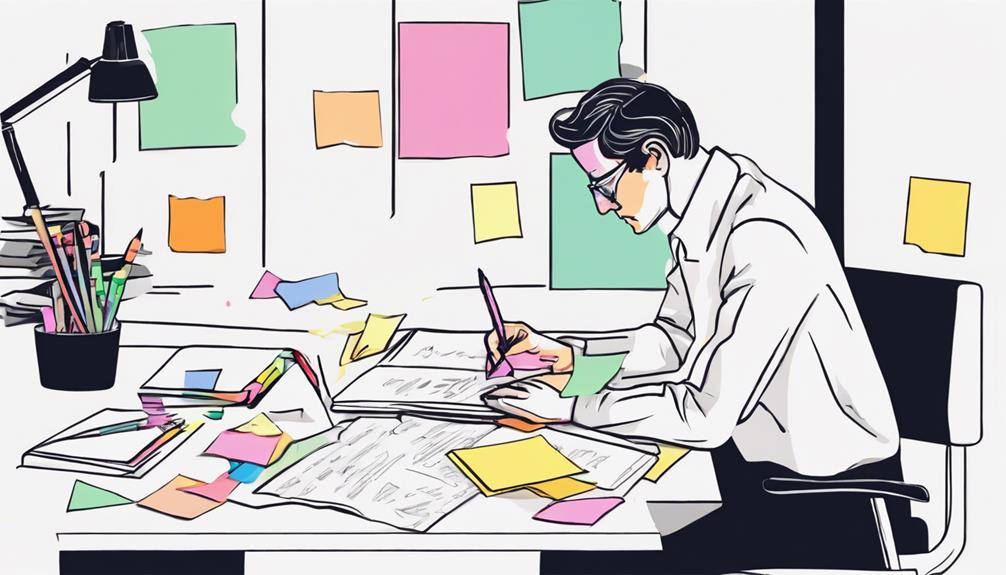In navigating the realm of criticism, one must approach it not as an assault on one's worth but as a valuable tool for growth. The ability to dissect feedback objectively, extracting kernels of truth from emotional reactions, is where the challenge lies. Yet, this process is not merely about acceptance; it is about transformation. By deciphering the code of criticism, one unlocks the potential for personal evolution and professional advancement. But how does one unravel this enigma of feedback? The answer may lie in a journey of self-discovery and introspection, as we delve into the intricacies of constructive criticism.
Key Takeaways
- Acknowledge feedback as a tool for personal growth and development.
- Maintain composure and openness to understand feedback effectively.
- Actively listen and reflect on feedback for meaningful improvement.
- Implement feedback by identifying areas for growth and taking actionable steps.
Acknowledge the Feedback

In the realm of constructive criticism, acknowledging the feedback received is not merely a courtesy but a fundamental step towards personal growth and development. Feedback serves as a mirror reflecting our actions and behaviors, offering valuable insights into areas that may require improvement. By acknowledging feedback, individuals demonstrate respect for the perspectives of others and show a willingness to engage in self-reflection. This act of acknowledgment is rooted in the understanding that feedback, whether positive or negative, is an essential catalyst for growth and development.
To truly benefit from feedback, one must be open-minded and receptive to the information presented. Reacting defensively or dismissing feedback outright hinders the opportunity for self-awareness and improvement. Instead, individuals should approach feedback with a mindset focused on learning and growth. Validating feedback by reflecting on its validity and considering how it aligns with personal goals and values is key to leveraging it for development. Embracing feedback as a tool for self-improvement fosters a culture of continuous learning and adaptation, ultimately leading to enhanced personal development.
Stay Calm and Open-Minded
Maintaining composure and an open mind when faced with criticism is essential for constructive growth. By staying calm and receptive, individuals can listen without reacting defensively, enabling them to truly understand the feedback provided. This approach fosters a productive dialogue that can lead to valuable insights and personal development opportunities.
Listen Without Reacting
Remaining composed and receptive when faced with criticism is fundamental in fostering constructive dialogue and personal growth. To effectively process the constructive feedback, it is essential to stay calm and keep an open mind. By resisting the immediate urge to react defensively, you can better understand the feedback being given. Listening without reacting allows you to give feedback your full attention, ask questions for clarification, and view criticism as an opportunity to help you improve. This approach fosters a constructive environment where different perspectives are welcomed, leading to personal development and enhanced communication skills. Embracing criticism with an open mind is a crucial step towards continuous self-improvement and achieving success.
Seek to Understand
Approaching criticism with a composed and open-minded demeanor is paramount in fostering a constructive dialogue and facilitating personal growth.
- Ask Questions: Seek clarification to fully understand the feedback provided.
- Process the Feedback: Reflect on the criticism to determine its validity and areas for improvement.
- Listen Closely: Pay attention to the details and underlying message in the constructive criticism given.
- Embrace Constructive Criticism: View feedback as an opportunity for self-improvement rather than a personal attack.
- Avoid Getting Defensive: Maintain a non-defensive stance to encourage open communication and mutual understanding.
Reflect on the Criticism

Upon receiving criticism, it is imperative to take the time to reflect on the specific points raised and analyze the feedback constructively. Criticism should not be viewed as a personal attack but rather as a valuable source of information that can lead to growth and improvement. By reflecting on the criticism received, individuals can gain a deeper understanding of the underlying message and identify areas where enhancements can be made. It is essential to analyze the feedback objectively, focusing on the content rather than the delivery. This approach allows for a more accurate assessment of the validity of the criticism and paves the way for meaningful change.
Moreover, reflecting on criticism involves looking for patterns or recurring themes in the feedback. Identifying these trends can provide insights into potential root causes that need to be addressed. Additionally, individuals should consider their own actions or behaviors that may have contributed to the criticism. By using criticism as a learning opportunity, individuals can leverage it to enhance their skills, performance, and overall personal development.
Separate Emotions From Feedback
When processing criticism, it is crucial to approach the feedback with a clear and rational mindset, separating emotions to objectively evaluate the information provided. Emotions have the potential to cloud judgment and obstruct one's ability to recognize the constructive aspects of criticism. By detaching emotions, individuals can better focus on the valuable insights and growth opportunities embedded within the feedback. Embracing a rational mindset not only allows for a more objective evaluation but also facilitates a more productive approach to addressing and implementing feedback effectively. Learning to manage emotions in the face of criticism is a vital aspect of personal development, enhancing one's ability to learn from feedback and adapt for future improvement.
- Separate emotions: Essential for objective evaluation.
- Objective evaluation: Key to understanding feedback clearly.
- Valuable insights: Found within criticism when emotions are set aside.
- Growth opportunities: Identified when emotions do not hinder assessment.
- Rational mindset: Enables effective feedback utilization and growth.
Identify Areas for Improvement

To effectively progress in personal development, it is imperative to reflect on recurring patterns in feedback to pinpoint areas requiring improvement. Seeking feedback from diverse sources allows for a comprehensive understanding of potential growth areas. Objectively analyzing feedback aids in extracting actionable insights crucial for constructive personal advancement.
Self-Assessment for Growth
Conducting a thorough self-assessment is imperative in identifying specific areas for improvement when faced with constructive criticism.
- Reflect on past experiences to identify patterns of criticism.
- Use self-assessment tools like SWOT analysis to pinpoint areas for improvement.
- Seek feedback from diverse sources to gain a comprehensive view of your performance.
- Set SMART goals based on the feedback received to track progress.
- Regularly evaluate your growth and development to measure the impact of constructive criticism.
Embrace Feedback Graciously
Embracing feedback graciously is a fundamental step towards identifying key areas for improvement in one's skills and performance. When receiving feedback, it is essential to process it thoughtfully to extract valuable insights that can lead to growth. Taking constructive criticism involves actively listening, being open-minded, and separating personal emotions from the feedback received. By giving feedback, individuals can help others recognize their blind spots and encourage them to work on specific areas for improvement. Constructive feedback creates a pathway for continuous self-improvement and professional development. Embracing feedback graciously not only benefits the individual receiving it but also fosters a culture of learning and growth within teams and organizations.
| Receiving Feedback | Giving Feedback |
|---|---|
| Listen attentively. | Provide specific examples. |
| Reflect on the feedback. | Offer suggestions for improvement. |
| Ask clarifying questions. | Focus on behavior, not personality. |
| Identify action steps. | Encourage dialogue for understanding. |
Implement Constructive Changes
Identifying specific areas highlighted in criticism is crucial for implementing targeted improvements effectively. To implement constructive changes based on received feedback, the following steps can be taken:
- Focus on actionable steps that can be implemented immediately.
- Prioritize feedback based on its potential impact on personal or professional growth.
- Develop a clear plan outlining how to address the identified areas for improvement.
- Monitor progress regularly to ensure the changes are being effectively implemented.
- Target specific areas for improvement to achieve meaningful growth and development.
Create an Action Plan

Developing a strategic plan of action is essential for effectively addressing areas of improvement highlighted by criticism. When feedback comes your way, it is crucial to take the time to analyze it, give constructive criticism to yourself, and seek advice from others on how to improve your performance. Constructive feedback should provide actionable steps that you can take to enhance your skills and abilities. It is equally important to receive constructive criticism graciously, as it offers valuable insights into areas that need development. To aid in the creation of an action plan, the table below outlines key steps to consider:
| Action Items | Details |
|---|---|
| Identify areas for improvement | Based on received criticism |
| Set achievable goals | To address feedback and track progress |
| Seek guidance or mentorship | To develop skills related to criticism |
| Implement changes gradually | Monitor impact and adjust as necessary |
| Reflect and adjust | Evaluate effectiveness and improve continuously |
Implement Changes Gradually
To enhance the effectiveness of incorporating feedback, a gradual implementation approach proves to be a strategic method for facilitating sustainable and lasting improvements. Implementing changes gradually offers several advantages:
- Gradual changes: Making small adjustments over time allows for a smoother transition to new behaviors.
- Adaptation: Gradual changes help in adapting to new feedback without feeling overwhelmed.
- Incremental adjustments: Making small, incremental changes enables smoother transitions to new ways of working.
- Resistance reduction: Gradual implementation reduces resistance to change, increasing the likelihood of long-term success.
- Lasting improvement: Slowly incorporating feedback ensures sustainability and lasting improvement.
Seek Support and Guidance

In the realm of constructive criticism, seeking support and guidance from mentors, colleagues, or other professionals is paramount for fostering growth and resilience. When faced with feedback, it is essential to reach out for help in navigating the complexities of constructive criticism. By engaging with individuals who can offer valuable insights and perspectives, one can better understand areas for improvement and develop strategies for constructive responses. Taking the time to seek guidance from those experienced in handling feedback can significantly enhance one's ability to process criticism in a positive and productive manner.
Furthermore, joining peer groups or forums dedicated to discussing experiences with criticism can provide a supportive environment for learning from others' strategies. Attending workshops focused on self-improvement and communication skills is another effective way to bolster one's capacity to deal with criticism constructively. For more personalized assistance, working with a coach or therapist can aid in developing resilience and constructive coping mechanisms when faced with challenging feedback. Embracing support and guidance is a proactive step towards embracing growth and harnessing the power of constructive criticism.
Celebrate Progress and Growth
Progress and growth should be acknowledged and celebrated as outcomes of effectively responding to constructive criticism. Embracing feedback allows individuals to recognize areas for improvement and capitalize on opportunities for personal development. To cultivate a positive mindset and encourage continuous improvement, it is essential to highlight achievements stemming from constructive criticism positively. Sharing successes not only reinforces one's progress but also motivates others to embrace growth opportunities. By celebrating progress, individuals reinforce their commitment to self-improvement and foster a culture of continuous learning.
- Recognize and celebrate the progress made in response to constructive criticism.
- Embrace growth opportunities that arise from feedback and use them to propel personal development.
- Highlight improvements achieved through constructive feedback to maintain a positive mindset.
- Share successes stemming from addressing criticism positively to encourage continuous growth.
- Cultivate a mindset of continuous improvement by acknowledging and appreciating the journey of growth.
Frequently Asked Questions
What Is the Best Way to Handle Constructive Criticism?
When considering the best approach to handling constructive criticism, aspects such as self-reflection, open communication, accepting feedback, growth mindset, seeking clarification, positive response, and mindful listening play crucial roles. These facets contribute to creating an environment conducive to personal development and improvement. Incorporating these elements in one's response to constructive criticism can lead to a more constructive and growth-oriented interaction, fostering continuous learning and progress.
How Do You Deal With Criticism Positively?
When dealing with criticism positively, it is essential to cultivate a growth mindset that views feedback as an opportunity for self-improvement. Embracing positive feedback, engaging in self-reflection, and fostering open communication are key elements. Emotional intelligence plays a crucial role in accepting criticism with grace and using it as a catalyst for personal growth. Responding constructively to criticism ensures a productive exchange and encourages continuous improvement.
Why Can't I Handle Constructive Criticism?
Individuals may struggle with handling constructive criticism due to various factors such as low self-confidence, past negative experiences, and difficulty distinguishing between types of criticism. Self-reflection, mindful listening, and emotional intelligence are key in accepting feedback for growth. Open communication, seeking feedback, and building resilience can help in embracing constructive criticism as a tool for personal and professional improvement.
How Do You Deal With Excessive Criticism?
When faced with excessive criticism, it is crucial to engage in self-reflection to understand the underlying reasons for the critiques. Setting boundaries and practicing self-care are essential to prevent feeling overwhelmed. Effective communication and seeking support can aid in emotional regulation and provide a different perspective on the criticism. Viewing criticism as learning opportunities for growth and resilience can foster a mindset of continuous improvement.
Conclusion
In conclusion, handling criticism constructively is crucial for personal and professional growth. According to a study by Harvard Business Review, 92% of respondents agreed that constructive feedback, when received and implemented effectively, can lead to improved performance and productivity. By acknowledging feedback, staying calm and open-minded, reflecting on criticism, and actively seeking areas for improvement, individuals can use criticism as a tool for development and progress.
